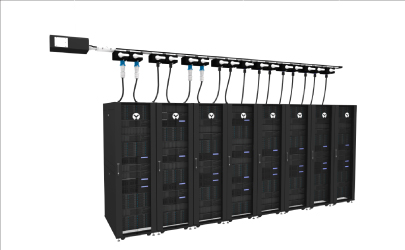Unlocking the Potential of Remote Power Panels in Asia-Pacific: Why Floor-standing Units Lead the Way

"The Asia-Pacific remote power panel (RPP) market is experiencing significant growth, driven by the rapid expansion of data centers and increasing adoption of digital technologies. With countries like China, Japan, and India leading the charge, the region has become a hub for IT infrastructure development and critical power management solutions. Floor-standing RPPs dominate the market due to their capacity to handle high power loads in large-scale data centers. Wall-mounted RPPs, though less prevalent, are increasingly adopted in smaller setups such as network cabinets and compact server rooms for their space efficiency and adaptability.
Government initiatives to support smart infrastructure, rising internet penetration, and the surge in cloud computing services contribute to this market's expansion. Additionally, investments from major players like ABB, Schneider Electric, and Vertiv further fuel innovation and market penetration. The growing need for energy-efficient and modular power distribution systems aligns with the global shift toward sustainable IT operations.
Challenges remain, such as cost constraints and technical complexities, but the Asia-Pacific region's strong focus on technological advancement positions it for sustained growth, with significant contributions to the global RPP market. "
The Asia Pacific Remote Power Panel market was valued at USD 483.94 Million in 2023 and is projected to reach USD 705.70 Million by 2030, with a compound annual growth rate (CAGR) of 5.8% from 2024 to 2030.
RPPs play a crucial role in these industries by ensuring an uninterrupted power supply, enhancing reliability, and promoting energy efficiency. Furthermore, there is a growing emphasis on energy efficiency and reducing operational costs, along with increased investments in smart grid technologies. This positions RPPs as a vital solution for modernizing power distribution networks.
The region’s focus on infrastructure development—particularly in industrial, telecommunications, and healthcare applications—further accelerates the adoption of RPPs. With these factors at play, the Asia-Pacific market is expected to maintain strong growth momentum in the coming years.
The rapid industrialization in countries like China, India, and Japan increases the demand for reliable power distribution systems to support manufacturing and infrastructure.
The rapid industrialization of countries such as China, India, and Japan is significantly driving the demand for Remote Power Panels (RPPs). As manufacturing, construction, and infrastructure projects expand, the need for stable and efficient power distribution solutions is increasing. RPPs provide a cost-effective method for managing power in industries that require uninterrupted operations, including factories, manufacturing plants, and large-scale construction sites. The ongoing urbanization and industrial growth in emerging economies make RPPs essential for modern power infrastructure.
The growing demand for data centers and telecom infrastructure drives the need for efficient power management systems to ensure continuous operations.
The IT and telecom sectors in the Asia-Pacific region are experiencing significant growth, driven by the increasing demand for digital services, e-commerce, and mobile communications. As data usage continues to rise exponentially, there is a corresponding need for data centers and telecom networks, which depend on highly reliable power systems to operate without interruptions. Reliable Power Providers (RPPs) play a crucial role in ensuring the consistent availability of power by managing electrical distribution, supporting critical infrastructure, and facilitating seamless service for expanding online platforms and telecom operations. With the ongoing shift toward cloud computing and digitalization, RPPs are essential for maintaining the efficient operation of these services.
Increased focus on energy efficiency across industries spurs the adoption of RPPs as part of sustainability efforts.
In response to rising energy costs and environmental concerns, the Asia-Pacific region is prioritizing energy efficiency. Both governments and industries are advocating for sustainable practices, and businesses are increasingly adopting power management systems, such as Resource Planning Processes (RPPs), to optimize energy consumption. RPPs play a crucial role in minimizing energy waste by providing effective power distribution and management, making them essential tools for achieving energy efficiency goals. This trend is particularly significant in industries like manufacturing, where reducing energy costs can greatly impact profitability, as well as in data centers, where energy efficiency is vital for controlling operational expenses.
Ongoing investments in infrastructure, including smart grids and renewable energy, push the demand for advanced power solutions like RPPs.
As part of ongoing infrastructure development, there is a significant investment in modernizing power distribution networks in the region. With the increasing integration of renewable energy sources and the expansion of smart grid technologies, Renewable Power Providers (RPPs) are essential for ensuring that power distribution systems are reliable, efficient, and scalable. Smart grids facilitate real-time monitoring and management of power usage, making RPPs crucial for integrating renewable energy, reducing losses, and improving grid stability. These infrastructure projects are vital for supporting urban expansion and industrial growth, which, in turn, drives the demand for RPPs in the region.
The integration of smart grid technologies and automation in the region boosts the need for modern power management solutions like RPPs.
Technological innovations, particularly the integration of automation and smart grid technologies, are transforming the distribution and management of power. Resource Planning Processes (RPPs) are increasingly being utilized alongside these technologies to enable centralized control, remote monitoring, and improved energy management. As automation becomes more prevalent, RPPs are essential in reducing the need for manual intervention, enhancing system reliability, and facilitating predictive maintenance. The combination of smart grids and RPPs enables more efficient power management, ensuring that electricity is distributed where and when it is needed, minimizing energy waste, and improving overall operational efficiency.
Competitive Landscape
Some of the major companies operating within the Remote Power Panel market are: ABB, Allied Power & Control, Delta Power Solutions, Vertiv Group Corporation, Toshiba International Corporation, Raptor Power Systems, C&C Power, Socomec, CRSC, Altruent Systems, Eaton, Schneider Electric and Others.